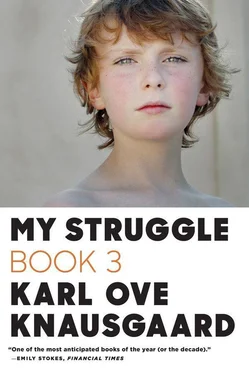Mom’s life differed in many ways from his. She had lots of friends, mostly because of her job, but also in other places, not least among the neighbors. With them she would sit and chat, or “prattle,” as Dad would say, and smoke and eat the cakes they had baked — if, that is, they weren’t knitting in the thick cloud of tobacco smoke that hung in so many living rooms in the seventies. She had an interest in politics, was in favor of a strong state, a well-developed health system, and equal rights for all, and was probably committed to women’s liberation and the peace movement, was against capitalism and the growing materialism, and sympathized with Erik Dammann’s The Future in Our Hands movement, in short she was on the left. She said she had hibernated during her twenties, everything was about her job, her children, and making ends meet, the budget was tight, you had to fight to keep to it, although in her early thirties she focused on herself and the society she was living in. While Dad rarely read anything other than what he had to, she was genuinely interested in literature. She was an idealist, he was a pragmatist; she was contemplative, he was practical.
They brought us up together even if I never experienced my upbringing as such; I always drew a strict distinction between them and perceived them as two utterly separate beings. But for them it must have been different. In the evenings when we were asleep they sat up talking — about the neighbors, colleagues, us, unless they were discussing politics or literature. Once in a while they went on holiday alone, to London, to the Rhine Valley, or into the mountains, while Yngve and I were with either Mom’s or Dad’s parents. They were more equal than the parents of my friends as far as chores in the house were concerned: Dad cleaned and cooked, which none of the other fathers did, not to mention all the food gathering they did at that time, all the fish he caught on the far side of the island and the hundreds of kilos of berries we picked on trips to the mainland in late summer and autumn, which afterward they converted into juice and jam and poured into bottles and jars to stand on the shelves in the cellar all winter, glowing dimly in the light from the little window at the top of the wall. Raspberries, blackberries, blueberries, cowberries, and cloudberries, which would excite Dad so much he would shout out if he found any. Sloes for wine. In addition, they would pay to pick fruit from gardens on Tromøya, and it was from there we had apples, pears, and plums. Then there was the cherry tree belonging to Dad’s uncle Alf in Kristiansand and, of course, both grandmothers had fruit trees. Our days were structured and clear: on Sundays it was lunch with dessert, on weekdays it was generally a variety of shapes and variants of fish. We always knew when we had school on the following day, how many lessons we had in which subjects, and not even the course of the evening was without a framework, as it was seasonally determined: if there was snow or ice on the ground, then it was skiing and skating. If the water temperature rose above fifteen degrees, well then, swimming was the order of the day, come rain come shine. The sole really unpredictable factor in this life, from autumn to winter, spring to summer, from one school year to the next, was Dad. I was so frightened of him that even with the greatest effort of will I am unable to recreate the fear; the feelings I had for him I have never felt since, nor indeed anything close.
His footsteps on the stairs — was he coming to see me?
The wild glare in his eyes. The tightness around his mouth. The lips that parted involuntarily. And then his voice.
Sitting here now, hearing it in my inner ear, I almost start crying.
His fury struck like a wave, it washed through the rooms, lashed at me, lashed and lashed and lashed at me, and then it retreated. Then it could be quiet for several weeks. However, it wasn’t quiet, for it could just as easily come in two minutes as two days. There was no warning. Suddenly, there he was, furious. Whether he hit me or not made no difference, it was equally awful if he twisted my ear or squeezed my arm or dragged me somewhere to see what I had done, it wasn’t the pain I was afraid of, it was him, his voice, his face, his body, the fury it emitted, that was what I was afraid of, and the terror never let up, it was there for every single day of my entire childhood.
After the confrontations I wanted to die. Dying was one of the best, most enjoyable fantasies I had. He would have fun then. He would be standing there thinking about what he had done. He would be feeling remorse then. Oh, what remorse he would feel! I visualized him standing there and wringing his hands in despair with his head turned to heaven in front of the tiny coffin where I lay, with my prominent teeth, unable to pronounce my r ’s.
What sweetness there was in that image! It almost put me in a good mood again. And that was how my childhood was; the distance between good and evil was so much shorter than it is now as an adult. All you had to do was stick your head out of the door and something absolutely fantastic happened. Just walking up to B-Max and waiting for the bus was an event, even though it had been repeated almost every day for many years. Why? I have no idea. But when everything glinted with moisture in the mist and your boots were wet from the slush on the road, and the snow in the forest was white and sunken, and we stood in a gang chatting or playing, or we ran after girls to trip them, grab their stocking caps, or simply throw them into a snowdrift, and I felt one of them against me as I squeezed my arms around her waist as tight as I could, perhaps Marianne, perhaps Siv, perhaps Marian, because they were the girls I prized and thought about most, all my nerves were a-quiver, my chest bubbled with joy — and why? Oh, because of the wet snow. Because of the wet down jackets. Because of the many good-looking girls. Because of the bus rattling along with chains on its tires. Because of the condensation on the windows when we went inside, because of the screaming and shouting, because Anne Lisbet was there, as happy and lovely, as dark-haired and red-mouthed, as she had ever been. Every day was a party, in the sense that everything that happened pulsated with excitement and nothing was predictable. Nor was it over when the bus came, it had only just begun, for the whole school day stretched out before us, with the transformation we went through when our wet clothes were hanging on hooks and we shuffled into the classroom in stockinged feet, with red cheeks and messy hair, wet at the tips because it had been outside the hat. The tingling in your body as the break beckoned, and we ran up the stairs, through the corridors, down the outside steps, across the playground, down the slope, and onto the field. And afterward, going home, playing music, reading, perhaps putting on skis and racing down the steep hill to Ubekilen, where the others always were, and all this at the intensity that only exists in childhood, standing at the bottom, back up herringbone style, racing down, until the darkness was so dense we could hardly see a hand in front of our faces and hung over our ski sticks chatting about everything and nothing.
The glimpse of ice on the bay covered by a shallow layer of water. The lights from the houses on the estate, which formed a kind of cupola over the forest above us. All the sounds the darkness amplified whenever someone shifted weight and the blue mini skis scraped against each other or cut into the soft snow. The car that came down the narrow gravel road, it was a Beetle, belonging to the people who lived there, the light shining a path across the ground, making everything spookily visible for a moment or two and then the darkness closing around us again.
Читать дальше












